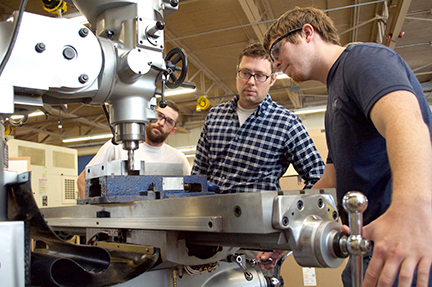Machining
 THE ULTIMATE FLEXIBILITY: The WVC Machining program now offers students the ultimate flexibility in scheduling.
The program is available for open enrollment* at any time during the academic year.
You can begin whenever your schedule allows, no need to wait! *For more information about financial aid eligibility, see the program guide.
THE ULTIMATE FLEXIBILITY: The WVC Machining program now offers students the ultimate flexibility in scheduling.
The program is available for open enrollment* at any time during the academic year.
You can begin whenever your schedule allows, no need to wait! *For more information about financial aid eligibility, see the program guide.
SKILL-BASED LEARNING: We offer competency-based education options for this program. This means as you master
knowledge and skills in machining, you can move at your own pace to completion of
the program. We can accommodate your schedule including work, life events and childcare.
To learn more, email Micky Jennings, machining program director.
Wenatchee Valley College's Industrial Technology Machining program is designed to meet the needs of those entering or working in the machining industry. With advances in machine and computer technology, the machining industry is undergoing change and creating job opportunities for skilled employees. Machinists are needed in areas such as aerospace, electronics, food processing, automotive repairs, public utility districts, county and city government transportation departments, specialty tool and equipment manufacturing, food packing plants and warehouses.
The machining program will provide students with fundamental machining skills and
experiences using current machining technologies and techniques. A graduate of theprogram will be prepared for entry into the machining industry as a conventional (manual)
or CNC (Computer Numerical Control) machinist. Instruction covers conventional turning,
milling and grinding, as well as basic programming, set up and operation of CNC machine
tools. Other subjects include shop safety, reading engineering drawings, shop mathematics,
machine tool theory, as well as lean manufacturing and other skills currently required
by the machining/manufacturing industry. In addition, students will be required to
complete a job shadowing experience and a program culmination capstone project.
current machining technologies and techniques. A graduate of theprogram will be prepared for entry into the machining industry as a conventional (manual)
or CNC (Computer Numerical Control) machinist. Instruction covers conventional turning,
milling and grinding, as well as basic programming, set up and operation of CNC machine
tools. Other subjects include shop safety, reading engineering drawings, shop mathematics,
machine tool theory, as well as lean manufacturing and other skills currently required
by the machining/manufacturing industry. In addition, students will be required to
complete a job shadowing experience and a program culmination capstone project.
This program offers a two-year associate of applied science degree (formerly the associate of technical science degree) as well as a one-year certificate of completion in conventional (manual) machining. Both are designed to prepare students for entry-level employment in the machining industry by integrating theory and practical applications.
Machine Operator Certificate - A 10-credit short certificate covering safe operations of machine tools, precision measurement, benchwork skills, and operating band saws and drill press. In addition, students will learn about hazardous material awareness and safety procedures in industrial facilities such as mills, smelters, power plants and packing facilities. They will have the opportunity to earn first aid, CPR, forklift, OSHA-10, Hazmat and flagger certifications. Learn more in the program guide.
- For more information about careers related to this field, go to My Next Move or the Employment Security Department Web page (scroll through the alphabetical list by occupation, or type an occupation into the search filter, such as electrical/electronics repair tech, electrical/electronics engineering tech or electro-mechanical tech.)
- Career Pathways Roadmap
Center of Excellence for Aerospace and Advanced Manufacturing Videos:
Additionally, upon completion of the WVC Industrial Technology-Machining Associate of Applied Science degree, the successful student will be able to:
- Operate a variety of CNC machines
- Set up tooling for CNC machining operations
- Complete moderately complex projects for manual and CNC machines.
- Demonstrate basic welding operations.
- Demonstrate a basic knowledge of electrical controls.
- Troubleshoot and repair basic hydraulic and pneumatic systems.
Upon completion of the WVC Machining certificate, the successful student will be able to:
- Demonstrate a practical and technical math reasoning ability.
- Use measuring equipment such as calipers, micrometers and indicators.
- Locate and use resources for material identification and tooling/machining characteristics.
- Correctly and safely operate a variety of turning and milling and general shop machinery.
- Handle, dispose of and/or safely use most hazardous and non-hazardous shop materials.
- Read and interpret blueprints and lay out projects.
- Navigate through current drafting software; create, save and print files.
- Use basic G and M codes for CNC machining.
- Demonstrate familiarity with proper employee conduct and workplace communication practices.


